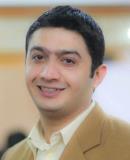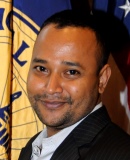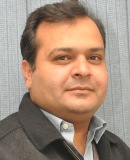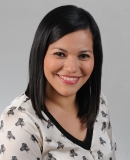2013 Fellowship Class
30th Anniversary Fellows
Waqas Banoori
Independent Press Network, Islamabad, Pakistan (Home Newsroom)
Pittsburgh Post-Gazette (U.S. Host Newsroom)
2013 Daniel Pearl-Saleem Shahzad Fellow
Waqas Banoori, 26, is an editor with the Independent Press Network in Islamabad, Pakistan. He is also a columnist for The Frontier Post, a leading English newspaper with circulation in Pakistan and Afghanistan.
From 2006-2007 Banoori was a correspondent with Saudi TV II where he produced issue-based programs on national and local Pakistan television. He also has worked with Pakistan national newswires including NNI and IPN and other publications. He has a wide range of interests including politics, international and regional issues, democracy, religion, environment, health, poverty and development.
In 2013, Banoori was a team leader for the first National Youth Summit. He is an Action Partner of Oxfam International Youth Partnerships and a member of Young Journalists Association of Pakistan.
In his application, Banoori notes that he began his journalism career during the time of a dictatorship followed by emergency rule and then an extremist society. “I will take this fellowship opportunity to work in a free environment,” he writes, “… to work in a society enjoying freedom, rights and privileges that we cannot even imagine in a developing country like Pakistan.”
He was a Daniel Pearl-Saleem Shahzad Fellow and was hosted by the Pittsburgh Post-Gazette.
Emran Hossain
bdnews24.com, Dhaka, Bangladesh (Home Newsroom)
Huffington Post (U.S. Host Newsroom)
2013 Daniel Pearl Fellow
Emran Hossain, 31, has been a staff reporter since 2012 at Bangladesh’s first online newspaper, bdnews24.com, in Dhaka, where he covers special assignments and works on the English desk of the bilingual newspaper.
He began his journalism career in 2003 as a Jahangirnagar University correspondent for The Daily Star. After completing his master’s degree in English literature, Hossain became a staff reporter at The Daily Star. His first series of four investigative reports in 2010 spotlighted state terrorism, particularly the extra-judicial killings by the Rapid Action Battalion (an elite anti-crime and anti-terrorism unit of Bangladesh Police).
Another investigation reopened the 1992 trial of accused drug adulterators; for which he received the Transparency International Bangladesh 2009 award.
In 2012, Hossain’s investigations inspired the documentary “Fear, Force & Fabrication,” which unveiled powerful and troubling relationships among government, media and human rights activists.
Based on past censorship of his print articles, Hossain writes, “I have come to realize that it is not the air-conditioned newsrooms of multi-storied media houses that can ensure professional excellence in journalism, but an individual’s consistent chase for the truth, often risking one’s own life and those of his family members.”
Emran Hossain was a Daniel Pearl Fellow. He was hosted by the Washington Bureau of the Huffington Post, where he honed his investigative journalism skills and gained the technical knowledge to practice investigative journalism across digital platforms.
Khalid Khattak
The News International, Lahore, Pakistan (Home Newsroom)
The Wall Street Journal, DC Bureau (U.S. Host Newsroom)
2013 Daniel Pearl Fellow
Khalid Khattak, 34, is a staff reporter for The News International in Lahore, Pakistan, where he has been covering education, youth affairs, health and social issues.
Khattak’s journalism career began in 2005 after he received his master’s degree in English literature from the University of Punjab. He has covered the Provincial Assembly of the Punjab (the unicameral legislature of elected representatives of the province of Punjab, which is located in Lahore in eastern Pakistan). Additionally, he has reported on the youth wings of the country’s political and religious parties.
Besides contributing to the weekly magazine of The News International, Khattak has written articles for foreign online magazines with particular focus on the changing media landscape in Pakistan. Until July 2012, he blogged at Asian Correspondent under the byline “Pakistan Voice.”
Khattak is a council member of the Lahore Press Club and a member of Punjab Union of Journalists.
In 2011, under the U.S.-Pakistan Professional Partnership in Journalism, Khattak worked at the Duluth News Tribune in Minnesota.
His fellowship goals are to explore and learn about free press in United States and better equip himself in the wake of emerging technological changes.
He was a Daniel Pearl Fellow and was hosted by the Washington Bureau of The Wall Street Journal.
Mugambi Mutegi
Business Daily, Nairobi, Kenya (Home Newsroom)
Chicago Tribune (U.S. Host Newsroom)
Mugambi Mutegi, 27, has worked for two years at Business Daily in Nairobi, Kenya. He reports on the country’s active corporate scene – interviewing many of its business executives.
Business Daily is the Kenya’s premier business newspaper and is part of the Nation Media Group, the largest privately owned media house in East and Central Africa.
Mutegi also has written reports on road safety and begun covering the emerging issues in Kenya’s education sector.
He’s looking forward to gaining a wider, more informed view of journalism from his time in the Chicago Tribune’s newsroom. His fellowship goals include sharpening his interviewing and digital journalism skills as well as improving his writing style and speed.
Mutegi was a Nation Media Group fellow and was hosted by the Chicago Tribune.
Glenda Ortega
America Economia, Guayaquil, Ecuador (Home Newsroom)
University of Missouri School of Journalism and Miami Herald (U.S. Host Newsroom)
Glenda Ortega, 30, is a reporter with America Economia, a magazine within Editorial Vistazo, in Guayaquil, Ecuador, where she reports on business news.
Since 2003, she has worked in print, radio and television news in Ecuador. Ortega was a political reporter for El Comercio, one of Ecuador’s most important newspapers. She also worked as a TV news producer.
Her fellowship goals are to develop her English writing skills and to learn more about media and digital journalism in United States – then to pass along her knowledge to her colleagues in Ecuador.
“This is a difficult moment for the journalists in Ecuador,” she writes. “I want to share with other fellows what is happening with the journalism in my country, because for me journalism is not about defending public and private media. Journalism is about being able to tell the stories and report on them in a better way to the reader, without a position … for or against a topic.”
Glenda Ortega’s fellowship was funded by the Lee Hills Chair in Free Press Studies at the Missouri School of Journalism. Her hosts were the Missouri School of Journalism and the Miami Herald.





